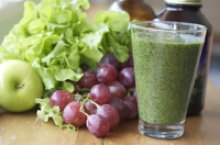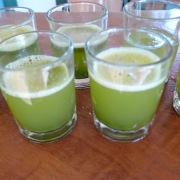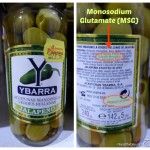Top 10 Tips for the Best Healthy Sunscreen
For many people, the summer months are a time to be outside, enjoying the beach or nature…and also the sun! But, what do you do to protect yourself from sunburn or sun damage? What can be used as a healthy sunblock? Is there such thing as a chemical-free or organic sunscreen?
All information in this article is for educational purposes only.
It is not for the diagnosis, treatment, prescription or cure of any disease or health condition.

Staying healthy in the sun!
Danger of Homemade Sunscreen Recipes
First of all, it’s important to be clear that homemade sunscreens are NOT a healthy alternative. I’ve seen many “mommy-and-me”-type blogs posting recipes for making sun creams at home, and there is definitely a lack of knowledge regarding the safety of ingredients. Why? Because the main ingredient is titanium dioxide, a known carcinogen! That’s right, a proven cancer-causing ingredient is right in the middle of that “made-with-love” sunscreen recipe!
It is true that there is some debate on the level of carcinogenic risk there is with titanium dioxide, with some people saying that ii is a safe ingredient when 99% pure and can only cause health risks when in a nano particle form. But do you want to take part in the human experiment? I don’t! And I certainly don’t want to make my own recipe where I could potentially use too much or use a version which hasn’t been tested for purity.
Zinc Oxide, another popular ingredient in homemade sunscreen recipes, has been found to have potential evidence of reproductive toxicity according to the Environmental Working Group investigation of sunscreens and other sun-blocking products. So, be sure to avoid any recipes containing this suspect ingredient as well.
How to Protect Yourself from the Sun
As someone who has lived on the beach for the last 12 years, I’ve spent a lot of time in the sun (mainly in Australia, USA, Thailand and Israel).
Here are my top ways to spend time enjoying the sun safely.
What to Use for the Best Healthy Sunscreen:
1.Wear a hat. It’s just that easy. Find one that is comfortable so you actually wear it.
2. Limit your time in direct sun, and avoid the hours between 10am – 2pm. I can usually spend between 60 – 90 minutes in the sun without sunscreen and without burning, but that’s after I have a base tan. Build your time exposer slowly. No need to fry yourself to a crisp!
3. Move to the shade. You can still enjoy many hours on the beach under an umbrella or in the shade of a tree. This is Mother Nature’s natural organic sun protection!
4. Wear a rash guard shirt in the sea. This is especially a good option for kids. Many surfing shirts actually have a high sun protection factor in the material of the shirt.
5. Have a sarong and/or long-sleeve light-weight cotton shirt to cover-up if necessary. When you feel yourself burning, it’s time to cover the skin!
6.Add chlorophyll to your diet. Why don’t plants and trees get sunburn or leaf cancer, especially when there are exposed to sun all day every day? Because the chlorophyll in leaves protects them from getting burned, and it can help protect you too! A daily Green Smoothie is the best way to start your day before you hit the beach!
7. If necessary, buy children’s sunblock or sunscreens. The child and/or baby formulas will have the least amount of toxic chemicals. When I know I’ll be out for more than 90 minutes, I apply a baby sunscreen to my nose and shoulders. A small amount is going to be much better for you than a full body immersion.
8. Check the labels and choose a brand with the least amount of titanium dioxide. I recently looked at some popular sunscreen brands, and I saw one expensive bottle contained 38% titanium dioxide in nano particles! Another brand contained only 12%. Can you see how you can still make a better choice, even if you still choose to use a traditional chemical formula?
9. Do not choose anything above Factor 30. When you increase the sunscreen factor, you also
increase the toxic chemicals in the ingredients. By choosing a Factor 30 sunscreen and limiting your time in the sun, you will be making a healthier choice for you and your family.
10. Be sure to shower after you finish your fun inthe sun. This sounds like common sense, but if you choose to put a chemical on your skin, you need to wash it off, hopefully with a sodium laureth sulfate (SLS)-free soap and only some organic coconut oil to hydrate your skin after.

Stay protected. Your skin will look better & younger, longer!
(Note: Coconut oil is NOT a safe option for sunscreen…I’ve seen many tourists getting fried to a red and blistered crisp in Thailand trying this, and it doesn’t work.)
Limiting your time and moving to the shade is the best alternative. A diet high in antioxidants will minimize any free-radical damage to the skin and will also limit the amount of “burn” to the skin. It’s certainly true that with a high raw food diet, I don’t ever seem to burn anymore, even after spending longer amounts of time in the sun. But I’m still careful not to overdo it.
More on Lymphatic Detox/Cleansing:
- 10 Detox Tips
- Dry Skin Brushing to Detox Lymphatic & Reduce Cellulite Naturally!
- How to Clean the Lymphatic System & Detox the Skin in 5 Simple Steps
- Top 5 Tips on How to Recover from Jet Lag & Travel
- What are the symptoms of a Herxheimer (Detox) Reaction?
Jennifer Betesh
Latest posts by Jennifer Betesh (see all)
- What is an elimination diet? - 28 March, 2019
- Intermittent fasting – What’s the best way? - 15 March, 2019
- How do you know when it’s time to STOP fasting - 28 February, 2019
- When is the BEST time (and WORST time) to START a detox - 20 February, 2019







 2019
2019


Thank you for posting this. I hate putting sunscreen on because of the toxins. I never thought to use the chlorophyl or a green smoothie , it makes perfect sense! Will be sure to share this information with family and friends. Great tips!